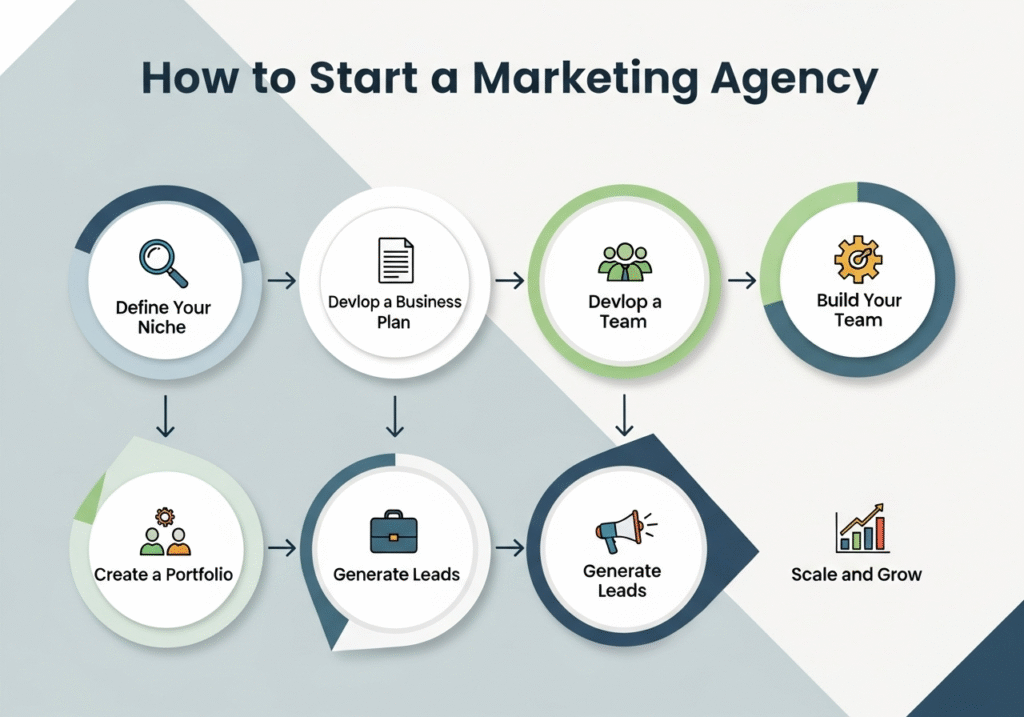Business owners and marketing teams struggling with search visibility need expert guidance to compete in today’s crowded digital landscape. Ben Stace semantic SEO consultancy services help companies move beyond traditional keyword stuffing to create content that truly connects with both search engines and real customers.
This comprehensive guide shows you Ben Stace’s proven methodology that transforms how search engines understand your business. We’ll explore which industries see the biggest wins from semantic SEO strategies and break down the measurable results you can expect when working with an experienced consultant who knows how to make your content rank and convert.
Understanding Semantic SEO and Its Business Impact

How semantic search transforms customer discovery
Modern search engines have evolved far beyond simple keyword matching. They now understand context, intent, and relationships between concepts, fundamentally changing how potential customers find your business. When someone searches for “best Italian restaurant near me,” search engines consider their location, the time of day, previous search behavior, and even seasonal preferences to deliver highly relevant results.
This shift means businesses can’t rely on stuffing pages with exact-match keywords anymore. Search engines now reward content that comprehensively covers topics and answers related questions customers might have. A local restaurant that creates content about Italian cuisine history, wine pairings, and seasonal ingredient sourcing will rank higher than one simply repeating “Italian restaurant” throughout their pages.
The transformation extends to voice search and mobile queries, where people use natural language rather than rigid keyword phrases. Customers might ask, “Where can I find authentic carbonara made with guanciale?” instead of typing “carbonara restaurant.” Semantic optimization ensures your content captures these conversational queries by understanding the relationships between concepts like authentic Italian ingredients, specific pasta dishes, and regional cooking methods.
Revenue growth through enhanced search visibility
Semantic SEO directly impacts your bottom line by capturing more qualified traffic at different stages of the customer journey. Traditional keyword-focused approaches often miss valuable long-tail searches that indicate strong purchase intent. When your content ranks for semantically related terms, you expand your visibility exponentially without proportionally increasing your marketing spend.
Consider a software company that traditionally ranked for “project management software.” With semantic optimization, they begin appearing for searches like “team collaboration tools,” “workflow automation solutions,” and “remote work productivity platforms.” Each additional ranking opportunity represents potential revenue that competitors focused solely on primary keywords miss entirely.
The revenue multiplier effect becomes particularly powerful for local businesses. A dental practice optimized semantically might rank for “teeth whitening,” “cosmetic dentistry,” “smile makeover,” and “dental anxiety solutions” – capturing patients they would never reach through basic “dentist near me” optimization alone.
Search visibility improvements translate into measurable business metrics: increased organic traffic, higher conversion rates from better-matched visitor intent, and reduced customer acquisition costs compared to paid advertising channels.
Competitive advantages of semantic optimization
Businesses embracing semantic SEO gain significant competitive moats that become increasingly difficult for competitors to overcome. While others chase individual keywords, semantically optimized companies build comprehensive topic authority that search engines recognize and reward with higher rankings across hundreds of related terms.
The competitive advantage extends beyond rankings to user experience improvements. Semantic optimization naturally leads to more comprehensive, helpful content that visitors spend more time engaging with. This increased dwell time and reduced bounce rate sends positive signals to search engines, creating a virtuous cycle of improved rankings and user satisfaction.
Smart businesses also gain first-mover advantages in emerging search behaviors. As voice search and AI-powered search features become more prevalent, companies already optimized for natural language queries and comprehensive topic coverage maintain their competitive edge while others scramble to catch up.
Brand authority develops organically through semantic optimization. When your content consistently appears for diverse but related searches, customers begin recognizing your brand as the go-to expert in your field. This brand recognition translates into higher click-through rates, more direct traffic, and improved conversion rates over time.
Long-term sustainability versus traditional SEO tactics
Traditional SEO tactics often create short-term gains that crumble when search algorithms update or competitors employ similar strategies. Keyword stuffing, link schemes, and thin content might provide temporary ranking boosts but leave businesses vulnerable to penalties and ranking volatility.
Semantic SEO builds sustainable organic growth by aligning with search engines’ fundamental goals: delivering the most relevant, comprehensive information to users. When you create content that genuinely serves your audience’s needs and comprehensively covers topics, you’re essentially future-proofing your SEO strategy against algorithm changes.
The sustainability advantage becomes clear when examining long-term traffic patterns. Businesses using semantic optimization typically see steady, consistent growth over months and years, while those relying on tactical approaches experience ranking fluctuations and traffic drops during algorithm updates.
Investment in semantic SEO compounds over time. Each piece of comprehensive content you create builds topic authority that supports all your other content. This creates an interconnected web of related pages that reinforces your expertise signals to search engines, making it increasingly difficult for competitors to displace your rankings.
The strategic approach also protects against penalty risks. Semantic optimization focuses on user value and natural content creation, eliminating the manipulation tactics that often trigger algorithmic penalties. This clean approach ensures your SEO investment continues generating returns rather than becoming a liability during search engine crackdowns on questionable practices.
Ben Stace’s Proven Semantic SEO Methodology

Comprehensive Content Strategy Development
Ben Stace’s approach begins with a deep dive into your business’s unique semantic landscape. This process involves mapping out the relationships between your core business concepts, identifying the language your audience actually uses, and understanding how search engines interpret your industry’s terminology. The strategy development phase includes analyzing your existing content assets, identifying semantic gaps that competitors might be exploiting, and creating a roadmap that aligns with both user intent and search engine algorithms.
The content strategy goes beyond traditional keyword targeting by focusing on topical authority and entity relationships. Ben creates comprehensive content clusters that demonstrate expertise across your entire business domain, ensuring that search engines recognize your website as a definitive resource in your field. This strategic foundation becomes the blueprint for all future content creation and optimization efforts.
Entity-Based Keyword Research and Mapping
Traditional keyword research focuses on search volume and competition metrics, but Ben Stace’s methodology digs deeper into entity relationships and semantic connections. This approach identifies not just what people search for, but how search engines understand the relationships between different concepts, brands, and topics within your industry.
The entity mapping process creates a detailed network of interconnected concepts that relate to your business. This includes identifying primary entities (your business, key products, services), secondary entities (related concepts, complementary topics), and supporting entities (industry terminology, location-based elements). The research reveals opportunities to establish authority around specific entity clusters that your competitors might be overlooking.
Ben’s keyword mapping extends beyond individual terms to encompass entire topic ecosystems. This comprehensive approach ensures that your content covers the full spectrum of user intent, from initial awareness through purchase decisions and beyond.
Technical Implementation for Search Engines
The technical foundation of semantic SEO requires precise implementation of structured data, schema markup, and entity signals that help search engines understand your content’s context and meaning. Ben Stace’s technical implementation focuses on creating clear pathways for search engines to crawl, index, and interpret your website’s semantic relationships.
This implementation includes optimizing internal linking structures to reinforce entity relationships, implementing proper schema markup for rich snippets, and ensuring that technical SEO elements support the broader semantic strategy. The technical work also involves optimizing page architecture to support topic clusters and ensuring that website performance doesn’t hinder the semantic signals being sent to search engines.
Performance Tracking and Optimization Refinement
Semantic SEO success requires tracking metrics that go beyond traditional rankings and traffic numbers. Ben’s performance tracking methodology monitors entity visibility, topical authority development, and semantic search performance across different query types and user intents.
The optimization refinement process involves continuous testing and adjustment based on semantic performance data. This includes monitoring how well your content performs for related entities, tracking improvements in topical authority, and identifying new semantic opportunities as they emerge. Regular performance reviews ensure that the semantic strategy evolves with changing search algorithms and user behavior patterns.
Integration with Existing Marketing Systems
Ben Stace’s semantic SEO consultancy services seamlessly integrate with your existing marketing infrastructure, ensuring that semantic optimization enhances rather than disrupts your current marketing efforts. This integration includes aligning semantic keyword strategies with paid advertising campaigns, coordinating content creation across different marketing channels, and ensuring that brand messaging remains consistent across all touchpoints.
The integration process also involves training your internal teams on semantic SEO principles, establishing workflows that maintain semantic consistency, and creating systems that allow for ongoing optimization without requiring constant external intervention. This holistic approach ensures that semantic SEO becomes a natural extension of your existing marketing operations rather than a separate, isolated effort.
Industries and Business Types That Benefit Most

E-commerce and retail businesses
Online retailers face unique challenges when competing for search visibility. Your product pages need to rank for countless variations of search terms, from broad categories to ultra-specific product features. Ben Stace semantic SEO consultancy services excel in this space by creating content architectures that capture the full spectrum of customer search intent.
E-commerce sites benefit tremendously from semantic optimization because customers search using natural language patterns. They might search for “best running shoes for flat feet” or “lightweight laptop under $1000.” Traditional keyword optimization often misses these longer, conversational queries that drive high-converting traffic.
Retail businesses see remarkable improvements in category page rankings when semantic SEO principles are applied. Instead of targeting isolated keywords, the approach creates topic clusters that help search engines understand product relationships and user needs. This strategy often doubles organic traffic within six months.
Product descriptions become powerful ranking tools when optimized semantically. Rather than keyword stuffing, the content naturally incorporates related terms, synonyms, and context that search engines recognize as comprehensive and valuable.
Professional services and consultancies
Service-based businesses operate in competitive landscapes where expertise differentiation matters. Law firms, accounting practices, marketing agencies, and consulting companies all struggle with the same challenge: how do you stand out when everyone offers similar services?
Semantic SEO transforms professional service websites by focusing on the specific problems clients need solved. Instead of competing for generic terms like “marketing consultant,” the strategy targets detailed scenarios like “B2B lead generation for manufacturing companies” or “tax planning for small business owners.
This approach works because potential clients search for solutions, not services. They’re looking for someone who understands their industry, their challenges, and their goals. When your content demonstrates this understanding through semantically rich, problem-focused content, you attract higher-quality leads.
Professional services also benefit from thought leadership content that showcases expertise across related topics. A comprehensive content strategy that covers industry trends, regulatory changes, and best practices establishes authority while capturing a wider range of search queries.
Technology and software companies
Tech companies face a unique SEO challenge: explaining complex products to diverse audiences with varying technical knowledge. Your potential customers might be C-suite executives, IT managers, or end users, each searching with different terminology and intent.
Semantic SEO bridges this gap by creating content that speaks to multiple audience levels simultaneously. Product pages can rank for both technical specifications and business benefits, capturing searches from different decision-makers in the buying process.
Software companies particularly benefit from semantic optimization because their products often solve multiple problems across various industries. A CRM system might help sales teams, marketing departments, and customer service representatives. Semantic SEO ensures your content captures all these use cases and their associated search patterns.
Technical documentation and help content become powerful organic traffic drivers when optimized semantically. Users search for solutions using natural language, asking questions like “how to integrate API with existing system” or “best practices for data migration.” This content serves existing customers while attracting new prospects researching solutions.
Measurable Results You Can Expect

Improved Organic Traffic Quality and Quantity
Businesses working with Ben Stace semantic SEO consultancy services typically see substantial improvements in both the volume and quality of their organic search traffic. Unlike traditional SEO approaches that chase high-traffic keywords regardless of relevance, semantic SEO attracts visitors who are genuinely interested in your products or services.
The quality improvement becomes evident when you analyze user behavior metrics. Visitors arriving through semantic-optimized content spend more time on your website, explore multiple pages, and demonstrate higher engagement rates. This happens because the content actually matches their search intent, creating a more satisfying user experience.
Traffic quantity grows steadily as your content begins ranking for clusters of related keywords rather than individual terms. Instead of targeting just “business consulting,” your content might rank for dozens of related phrases like “strategic business advice,” “operational efficiency consulting,” and “business transformation guidance.” This semantic approach captures traffic from various angles while maintaining relevance.
Higher Conversion Rates from Search Visitors
The most significant benefit of semantic SEO lies in its impact on conversion rates. When your content aligns perfectly with user intent, visitors arrive with a clearer understanding of what you offer and how it solves their problems.
Traditional SEO might bring 1,000 visitors with a 2% conversion rate, resulting in 20 leads. Semantic SEO typically brings fewer visitors initially but with conversion rates often reaching 5-8%, sometimes higher. Even with 600 visitors, you’re looking at 30-48 high-quality leads who are better qualified and more likely to become customers.
This improvement stems from semantic SEO’s focus on answering specific questions and addressing real pain points. When someone searches for “why is my business struggling with digital transformation” and finds your comprehensive guide that directly addresses their situation, they’re much more likely to trust your expertise and reach out for help.
Enhanced Brand Authority and Thought Leadership
Semantic SEO positions your business as the go-to authority in your field by creating comprehensive, interconnected content that demonstrates deep expertise. Instead of publishing scattered blog posts, you develop content ecosystems that showcase your knowledge across all aspects of your industry.
Search engines recognize this comprehensive approach and begin associating your brand with expertise in your field. Your content starts appearing in featured snippets, knowledge panels, and other prominent search features that establish credibility before users even click through to your website.
This authority building has a compound effect. As your content gains recognition, other websites begin linking to your resources, further boosting your search rankings. Industry publications start referencing your insights, and potential customers begin recognizing your brand as a trusted source of information before they’re even ready to buy.
Reduced Dependency on Paid Advertising
One of the most financially impactful results of effective semantic SEO is the reduced need for expensive paid advertising campaigns. As your organic visibility improves, you’ll find yourself spending less on Google Ads, social media advertising, and other paid channels while maintaining or increasing your lead generation.
Many businesses working with semantic SEO consultants report reducing their advertising spend by 40-60% within 12-18 months while maintaining similar or improved lead quality. The money previously spent on ads can be reinvested in content creation, product development, or other growth initiatives.
The long-term value of this shift can’t be overstated. While paid advertising stops delivering results the moment you stop paying, well-executed semantic SEO continues generating leads for months or years after the initial investment. Your content becomes a sustainable asset that works around the clock to attract and convert potential customers.
Getting Started with Ben Stace’s Consultancy Services

Initial business assessment and SEO audit
Ben Stace’s consultancy begins with a comprehensive evaluation of your current digital presence and semantic SEO positioning. During this initial phase, your website undergoes a detailed technical analysis that examines site structure, content architecture, and existing keyword strategies. The assessment covers critical elements like schema markup implementation, entity relationships, and topical authority gaps that may be limiting your search visibility.
The SEO audit process involves deep analysis of your competitors’ semantic strategies, identifying content clusters they’re winning with, and uncovering untapped opportunities in your market space. Ben examines your current content’s semantic relationships, evaluating how well your pages connect topics and concepts that search engines recognize as authoritative signals.
This foundational step typically takes 1-2 weeks and produces a detailed report highlighting immediate opportunities, technical issues requiring attention, and strategic recommendations for semantic enhancement. The audit results become the roadmap for your customized strategy development.
Customized strategy development process
Following the initial assessment, Ben creates a tailored semantic SEO strategy that aligns with your specific business goals and market dynamics. This process involves developing comprehensive topic clusters and content hierarchies that establish your brand as a topical authority in your industry.
The strategy development focuses on creating entity-based content frameworks that help search engines better understand your business’s expertise and relevance. Ben maps out semantic relationships between your products, services, and industry concepts, ensuring your content strategy supports natural language processing algorithms.
Each strategy includes specific recommendations for content creation, internal linking structures, and schema implementation that will strengthen your semantic footprint. The development process typically spans 2-3 weeks and includes stakeholder consultations to ensure alignment with your business objectives and resource capabilities.
Implementation timeline and milestones
The implementation phase follows a structured timeline with clearly defined milestones to track progress and maintain momentum. Initial technical optimizations typically begin within the first month, focusing on schema markup, site structure improvements, and foundational semantic elements.
Content development and optimization follow a phased approach, with priority pages receiving immediate attention while broader content clusters are developed over 3-6 month cycles. Each milestone includes specific deliverables, performance benchmarks, and review points to ensure the strategy remains on track.
Key milestones include:
- Month 1: Technical foundation and priority page optimization
- Month 2-3: Core content cluster development and internal linking enhancement
- Month 4-6: Expanded topic coverage and semantic relationship strengthening
- Month 7+: Advanced optimization and competitive positioning
Ongoing support and optimization programs
Ben Stace semantic seo consultancy services include continuous monitoring and refinement to maintain and improve your semantic SEO performance. The ongoing support program provides regular performance reviews, algorithm update adaptations, and strategic adjustments based on search landscape changes.
Monthly optimization sessions focus on identifying new semantic opportunities, refining existing content clusters, and expanding topical authority in emerging areas. Ben provides quarterly strategy reviews that assess progress against initial goals and recommend strategic pivots when market conditions change.
The support program includes access to performance dashboards, regular reporting on semantic SEO metrics, and priority consultation for urgent optimization needs. This ongoing relationship ensures your semantic SEO strategy evolves with your business growth and maintains competitive advantage in your market space.

Ben Stace’s semantic SEO approach goes beyond traditional keyword stuffing to help search engines truly understand your business and connect you with the right customers. His proven methodology delivers measurable results across various industries, from e-commerce to professional services, by focusing on context, user intent, and comprehensive content strategies that build lasting organic visibility.
Ready to transform your search presence and drive meaningful business growth? Ben Stace’s consultancy services offer the expertise and personalized approach you need to stay ahead in today’s competitive digital landscape. Reach out today to discover how semantic SEO can unlock your website’s full potential and connect you with customers who are actively searching for exactly what you offer.



